The WELCOMMON HOSTEL is a seven-floor facility building in the center of Athens that offers accommodation for people of all ages and places, a hostel for sustainable tourism, a proposal for accommodation of social, cultural and environmental active groups and persons during their stay in Athens. Our moto is “sleep for dreaming, be active for cultural, social and environmental /climate issues”. The WELCOMMON HOSTEL is run by the social cooperative Anemos Ananeosis / Wind of Renewal, established in 2014 for the promotion of social and green innovation, sustainable tourism, environmental and climate potection, energy transition, social inclusion and intercultural dialogue.
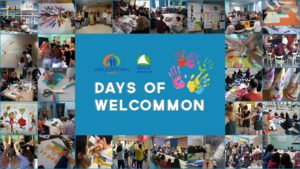
The WELCOMMON Hostel is something more than just a nice hostel with social impact. It is also a place for social gathering and experiment, a center for innovation and art, as well as a centre for social and green innovation and economy, for social and job integration for Greek locals, migrants and refugees.
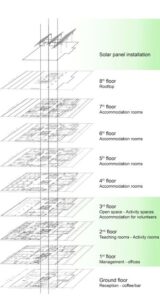
Five floors of the seven storey building can provide accommodation to up to 150 people. Our guests have a variety of options for accommodation in the WELCOMMON HOSTEL: a four or eight-bed dormitory, a five-bed room, a four-bed room, a three-bed room, a twin or double bed room or a single. Regardless of what they select, all rooms are comfortable, clean and attractive; a lot has been artistically designed with reused items, always with the comfort of our guests in mind.
Two floors of the Welcommon Hostel are dedicated to our social, cultural and green activities, providing opportunities to guests, international volunteers and refugees to collaborate and learn together.
Special place, people, values
Our guests are all different travellers (tourists, volunteers, erasmus students, nomads-workers, newcomers, refugees). Our vision is to bring close people from all over the world without discrimination, to enable them to communicate, to be entertained and to explore the creative side of Athens. Our guests have the opportunity to participate directly and indirectly in green, social, humanitarian and inclusive – intercultural projects, events and activities. They can also contribute with their ideas and experience. WELCOMMON Hostel means welcome in common – together.
 In the WELCOMMON Hostel we can introduce our guests to the world of Greece’s cultural, environmental and social organizations as well as of social economy. We can connect them with the creative side of the city and social organisations, we can inform them about the situation of social economy, climate movement or refugees in our country. And, they can play music in our bar.
In the WELCOMMON Hostel we can introduce our guests to the world of Greece’s cultural, environmental and social organizations as well as of social economy. We can connect them with the creative side of the city and social organisations, we can inform them about the situation of social economy, climate movement or refugees in our country. And, they can play music in our bar.
We are a bicycle-friendly hostel and our guests can leave their bicycle …at the reception during their stay or they can rent a bicycle for a city tour. All the hostel is accessible to disable persons but there is also a special designed room for 3-4 disable persons.
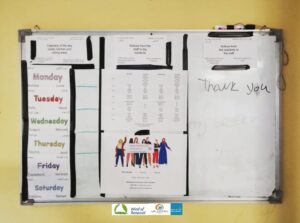
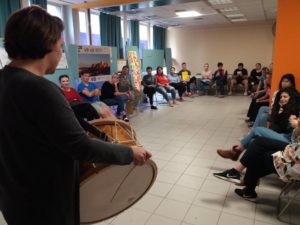
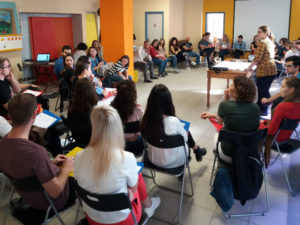
The hostel highlights the positive impact that sustainable tourism – and cooperatives and social enterprises – have on communities, revitalizing neighborhoods, making bridges between communities, social groups, newcomers and local people.
Supporting the local economy, contributing to environmental sustainability
We contributed to the revitalization of the neighborhood during the financial crisis period (2016-2021) and we continue to support the local economy with social and green procurement, reduction of single use plastics and with a zero-waste strategy. We have recently published the results of our green renovation that had a major impact on hostel’s performance. We managed not only to reduce the building’s electrical consumption and use renewable energy, but also to minimize greenhouse gas emissions produced by fossil fuels.
We apply a waste minimizing system, especially reducing one-way plastics, increasing seperation at source and recycling, while the whole WELCOMMON HOSTEL was based on a rational upcycling and re-use, which is actually an example of how we can combine reuse with high quality aesthetic effect and functionality. We have signed and are implementatimg the INTERNATIONAL TOURISM PLASTIC PLEDGE
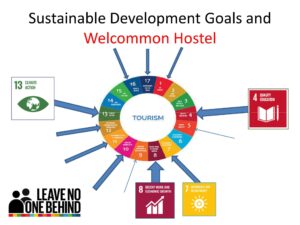
A hostel with social impact
Since its launch, we have successfully provided accommodation for more than 1500 kids, teens and adults and 330 volunteers, who have participated in intercultural courses and activities for refugees and migrants. We offer classes (e.g. for language, painting, puppet show, music etc) with the support of volunteers to refugees, migrants, local people, tourists; we work for the empowerment and training of our guests and design interactive workshops for the professional training and promotion of the abilities and qualifications of refugees, especially the young persons, along with Greek nationals, in order to be able to find their way in our societies for the benefit of our societies.
We are very proud that our social cooperative enterprise ANEMOS ANANEOSIS / WIND OF RENEWAL has received 5 European-level distinctions for our innovation and contribution to the social economy. It is a great honor for Anemos Ananeosis / Wind of Renewal to have been awarded the European Citizen’s Prize on 9th of October 2018, in the European Parliament. HOSTEL WORLD named our WELCOMMON HOSTEL as one of the Hostel Heroes, “a hostel that in the midst of the crisis is supporting the community coming together… building a better world!”
Lastly, we are thrilled to announce that our WELCOMMON HOSTEL was distinguished as the best social / intercultural action of the year in Greece during covid-19; the competition was organized by the national network of “Anna Lindh Foundation“, the euro-med network for the intercultural dialogue. As of June 2020, even the sustainable tourism collapsed and at the same time thousands of recognized refugees and asylum seekers in Greece were left homeless in the midst of a global pandemic, therefore we decided to host a number of refugees, the most vulnerable between them, such as survivors of sexual violence, torture and ill treatment, the elderly, people with chronic diseases, pregnants and mothers with new borned babies. The vision for the Welcommon Hostel, was to be a sustainable solution to host all the travellers. If you’ve ever come into the Welcommon you probably felt that it is a special place, a place where you can meet people, learn from them… it is a community. Special place, people, values.
Nowadays, our world is transforming at a staggering pace, impacting the space, physical and man-made, we live and work, for better and at times for worse. Athens, in particular, where our hostel is located, is a city in crisis but at the same time one can see a real change if one decides to be part of the social and ecological change. We have decided to be part of this social and green transition.
We want to be financially, socially and environmental sustainable
The first step is crucial: we want to be financially and socially sustainable. Sustainability has to do also with the economic aspect of an enterprise, company or household. As a cooperative we don’t share profits, if there is we invest it in new jobs, social, climate and green activities. The WELCOMMON HOSTEL aims to cover with the generated income, the operation of the hostel, the creation of new jobs in innovation, climate projects and the cost of services offered to a number of refugees aiming at their housing, social inclusion, and non-formal education. Everyday, we make an effort to improve our services, make our hostel more convenient, friendly and live, more artistic and social, inspiring at the same time our staff, volunteers, guests and visitors to get involved and adopt a more responsible and sustainable way of traveling and living.
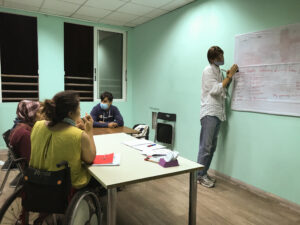
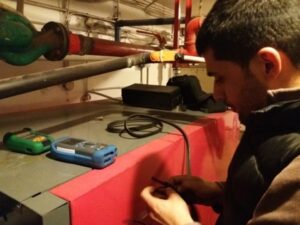
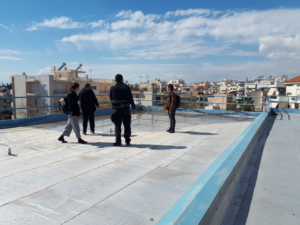
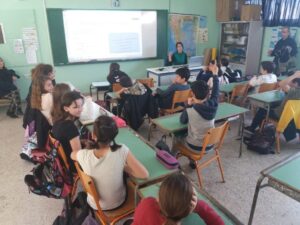
The day after
The next step is also very important to us; we are committed to support the transition to an energy-efficient and green economy, in creating a new center for eco-friendly projects and practices; we also aim to contribute to reducing the energy poverty of households, offering them know-how and support so that they can exit a difficult situation through social empowerment and energy efficiency.
Sustainable Practices and impacts
In t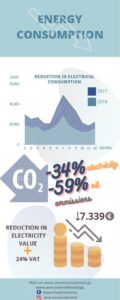 he Wel
he Wel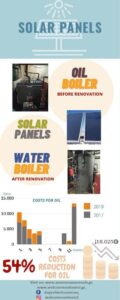 common Hostel there is an installation of 20 solar panels for the production of hot water for shower and domestic use. It is a fact that the production of hot water is a major source of energy-consumption and economic duty of accommodation buildings and the ways of producing it most of the time is related to use of fossil fuels, a practice that is environmentally damaging. This is why, faithful to our purpose of creating a sustainable and environmental fair society, we chose an alternative source of energy to adapt the need of hot water to a carbon-free practice. (see infographic)
common Hostel there is an installation of 20 solar panels for the production of hot water for shower and domestic use. It is a fact that the production of hot water is a major source of energy-consumption and economic duty of accommodation buildings and the ways of producing it most of the time is related to use of fossil fuels, a practice that is environmentally damaging. This is why, faithful to our purpose of creating a sustainable and environmental fair society, we chose an alternative source of energy to adapt the need of hot water to a carbon-free practice. (see infographic)
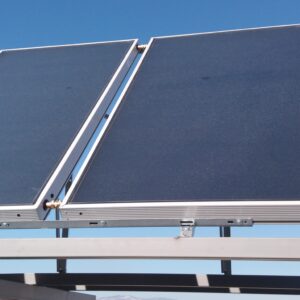
– Another measure implemented in the hostel is the use of LED lighting lamps, which might seem like a minimum expense for a household, but for a 7-story building with more than 10 rooms/story, plus the corridors, staircases, storage rooms etc. with lighting needs ended up to be a significant investment. However the result for this investment was also significant and it is well portrayed in the electric bills afterwards. (see infographic)
– 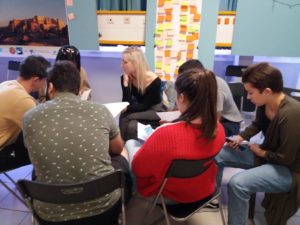
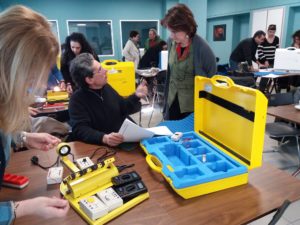
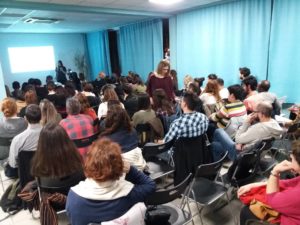
The WELCOMMON Hostel have been designed as an open center for social inclusion, green transition and green – social jobs for young people. The aim is to create new employment opportunities for everyone in areas such as sustainable tourism, up-cycling, green / cyclic economy, energy efficiency and others.
A large number of projects have been and still are realized regarding green transition and the Welcommon Hostel provides the premises and work-space to take on these initiatives.
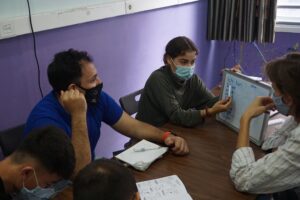 – Moreover Welcommon Hostel is a physical space that welcomes every social, cultural and environmental active group to do their meetings, lectures, presentations or conferences to contribute actively to the dissemination of eco-friendly ideas.
– Moreover Welcommon Hostel is a physical space that welcomes every social, cultural and environmental active group to do their meetings, lectures, presentations or conferences to contribute actively to the dissemination of eco-friendly ideas.
Another action is the effort we undertook in 2017-2020 to promote climate action and energy efficiency in schools, provide a basic training of educators as well as pupils, in order to raise awareness about the climate challenge not only inside the strict boundaries of the hostel and its visitors but also in the wider society.
Realised projects :
a) EUKI- CLIMATE SCHOOLS Be.Ath, a European Climate Initiative (EUKI ) program 2017-2020
b) EUKI-YESClima: Young energy experts working for climate-friendly schools and energy efficiency“, a European Climate Initiative (EUKI) program 2018-2020.
c) EUKI-ZEWklima: ZEWKlima – Future Opportunities in Energy Transition in Southern Europe
and many events, seminars and workshops on energy transition, climate protection, energy cooperatives.
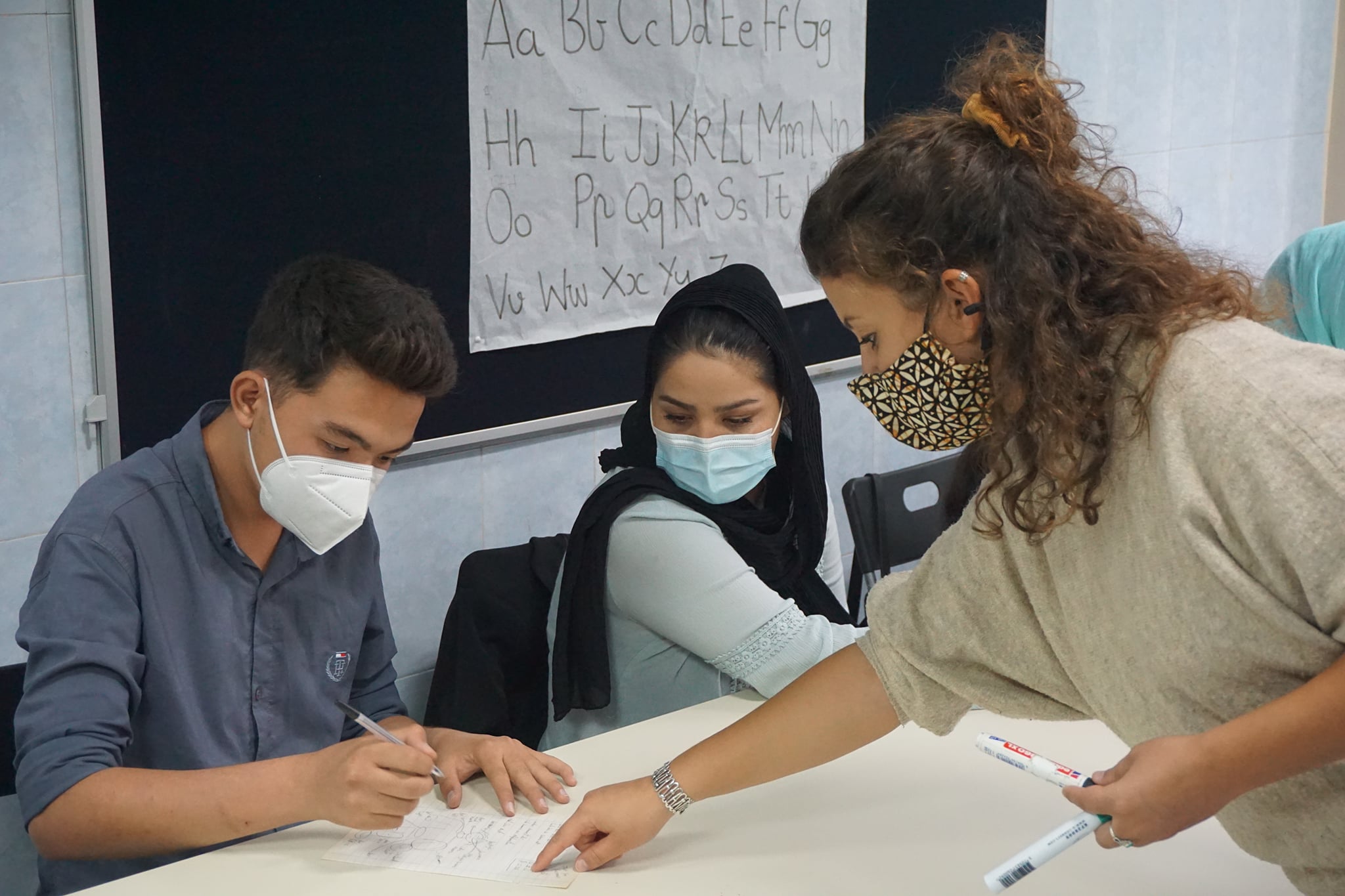
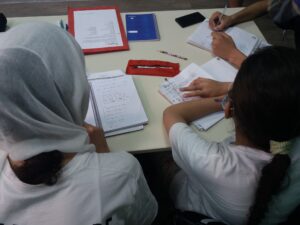 I started volunteering in the project in the very beginning of October 2020 and I stopped in March 2021. Those 6 months felt like 2. I did not plan on staying that long there, but I got caught by the beauty of the place. Anemos Ananeosis and the Welcommon Hostel have beautiful projects about social and environmental impact that follow my principles and made me feel like I have my place here.
I started volunteering in the project in the very beginning of October 2020 and I stopped in March 2021. Those 6 months felt like 2. I did not plan on staying that long there, but I got caught by the beauty of the place. Anemos Ananeosis and the Welcommon Hostel have beautiful projects about social and environmental impact that follow my principles and made me feel like I have my place here.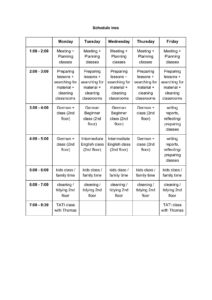 At the beginning I started exclusively teaching German and English to refugees not living in the hostel, and just visiting for the classes. But when Covid-19 hit harder, the restrictions became stricter and we could not welcome people from outside of the hostel anymore, so we decided to teach to the residents.
At the beginning I started exclusively teaching German and English to refugees not living in the hostel, and just visiting for the classes. But when Covid-19 hit harder, the restrictions became stricter and we could not welcome people from outside of the hostel anymore, so we decided to teach to the residents.

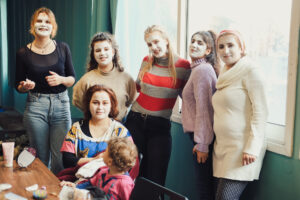
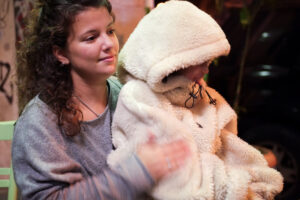 But this is not all. The things that I will mostly remember about these 6 months is the love that children gave me, all the drawings that I will bring back to France in my suitcase, the weird ways of communicating that we end up developing to be able to understand each other, the delicious meals from all around the world that people cooked and invited me to try, all the laughter, all the time google translation saved or failed us etc…
But this is not all. The things that I will mostly remember about these 6 months is the love that children gave me, all the drawings that I will bring back to France in my suitcase, the weird ways of communicating that we end up developing to be able to understand each other, the delicious meals from all around the world that people cooked and invited me to try, all the laughter, all the time google translation saved or failed us etc…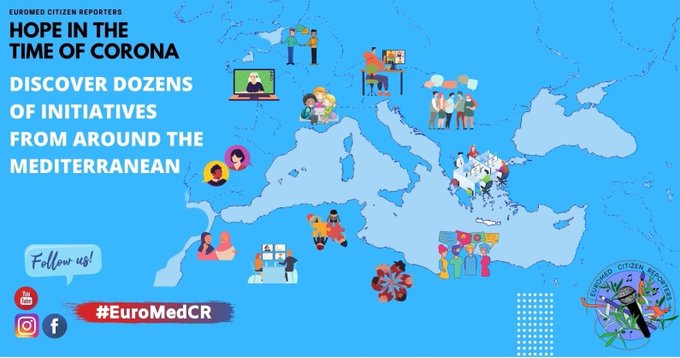

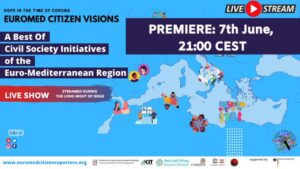
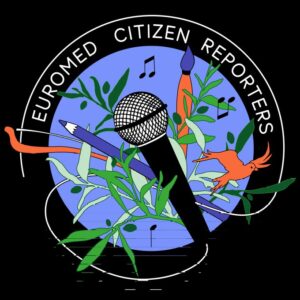
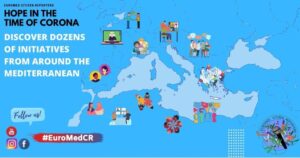
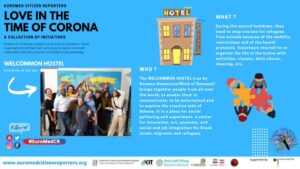
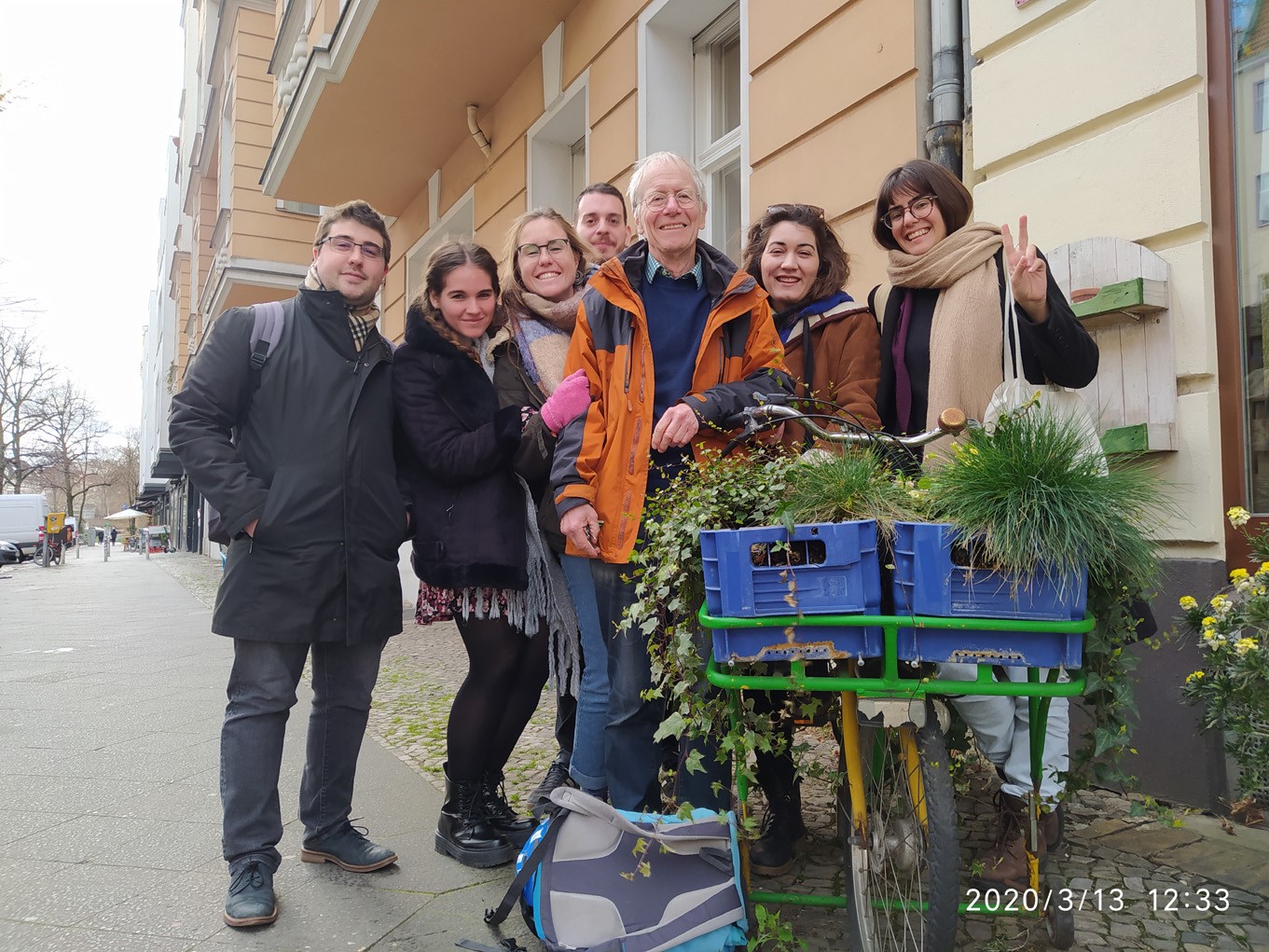
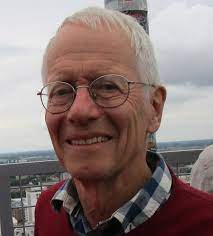 by Hartwig Berger,
by Hartwig Berger, 
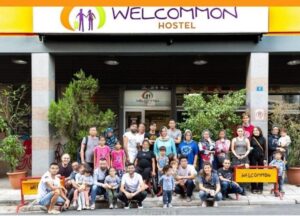


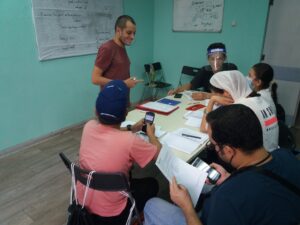
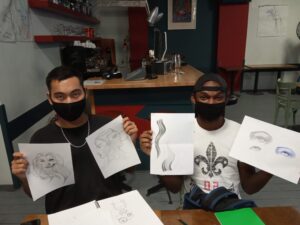
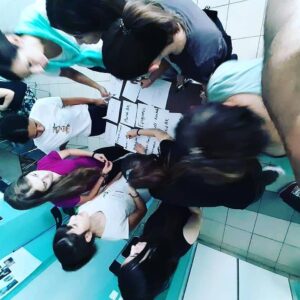

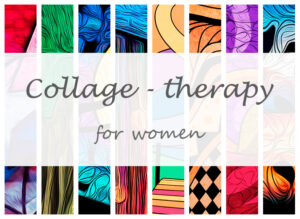
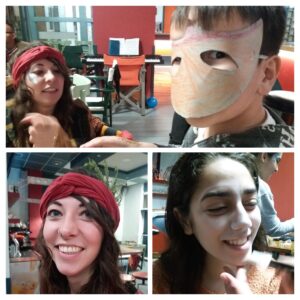
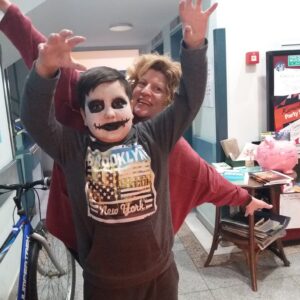
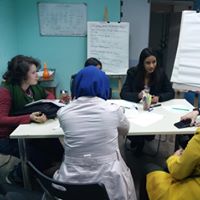
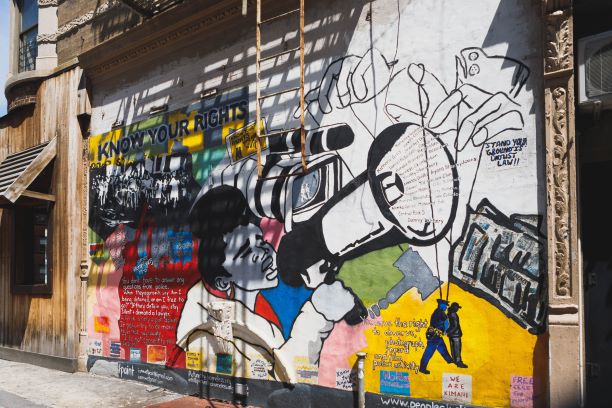

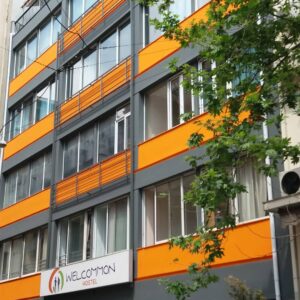








 he Wel
he Wel




 – Moreover Welcommon Hostel is a physical space that welcomes every social, cultural a
– Moreover Welcommon Hostel is a physical space that welcomes every social, cultural a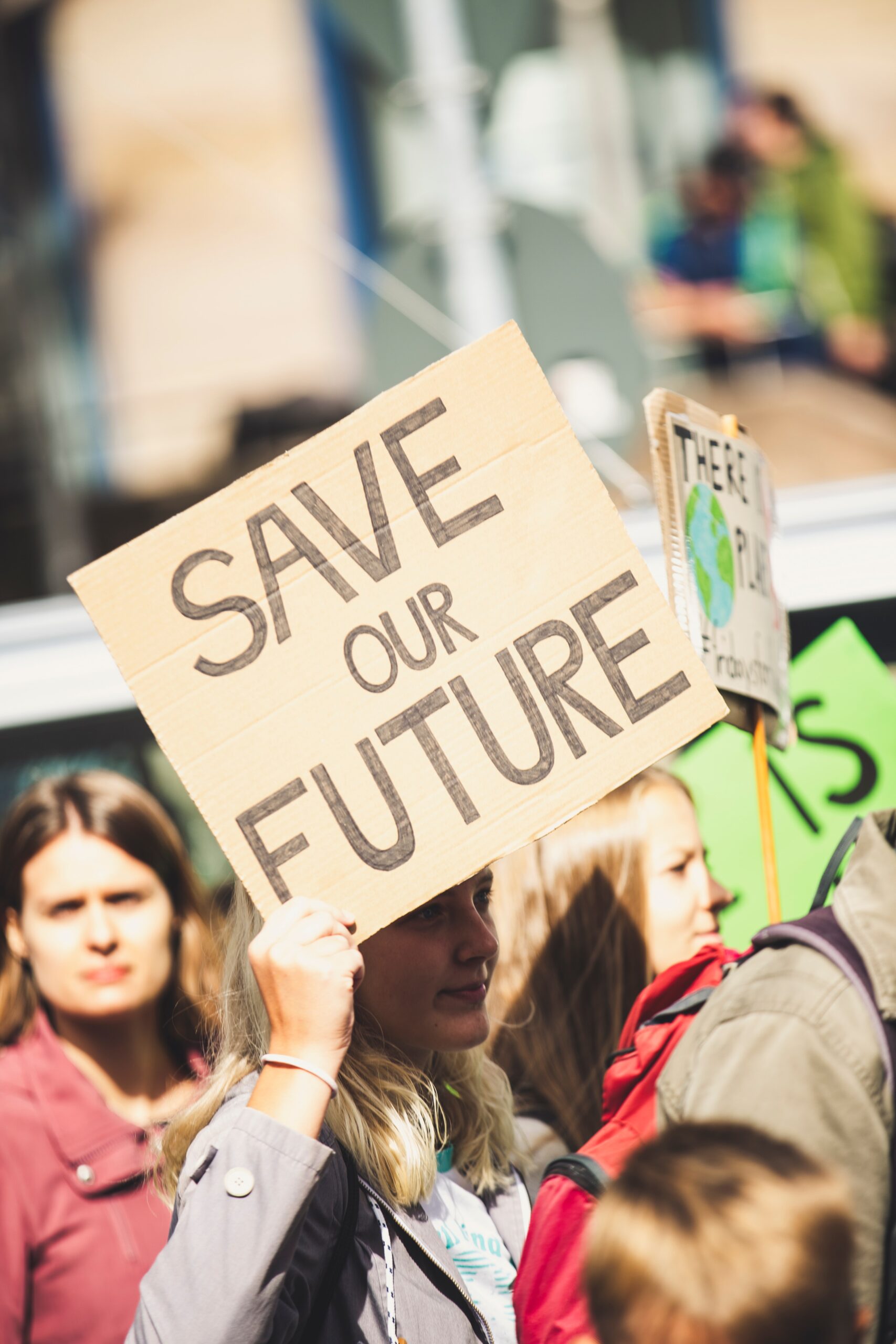
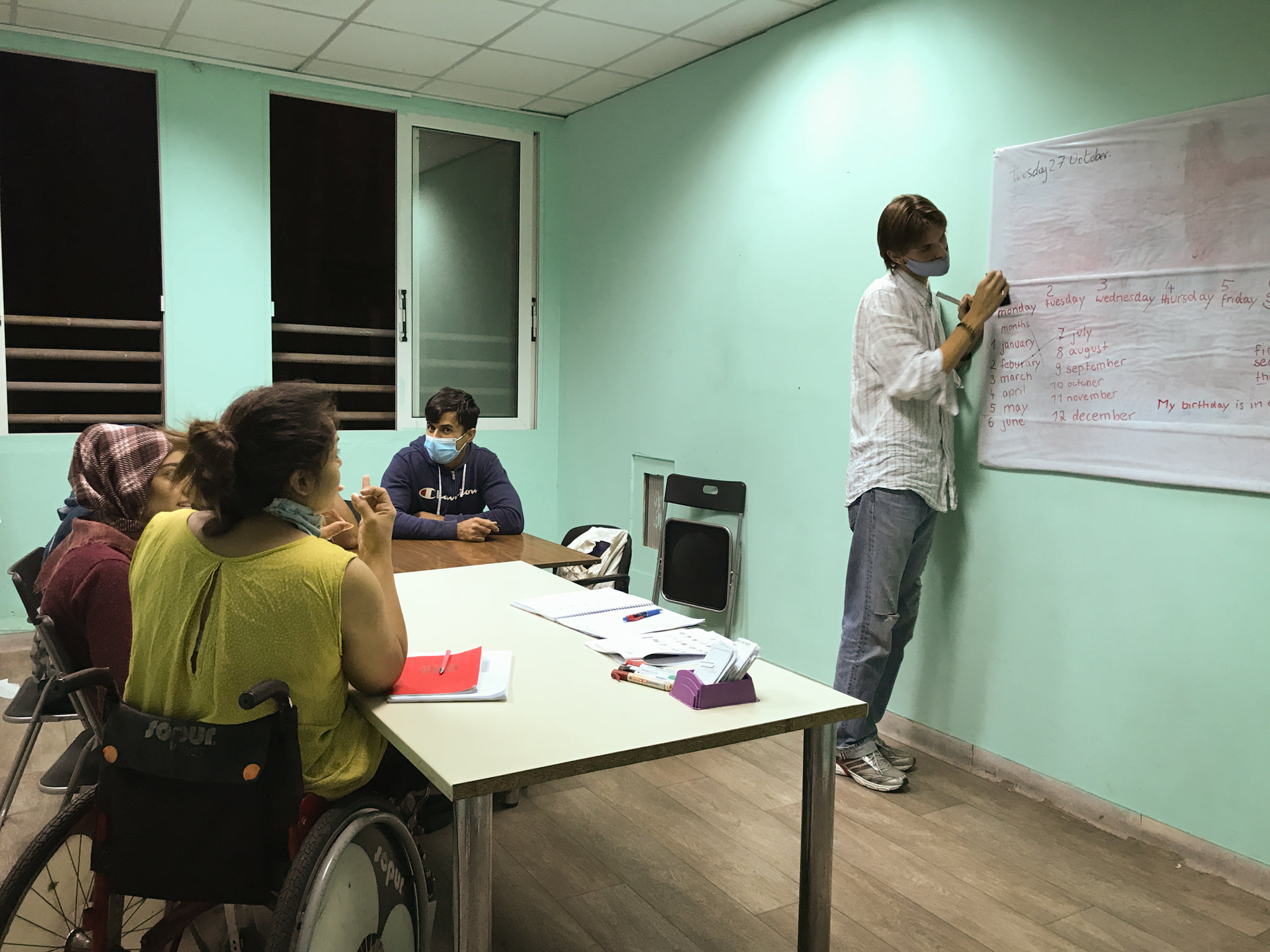
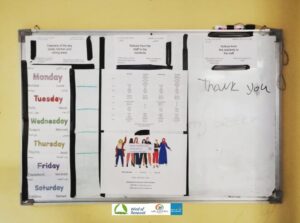
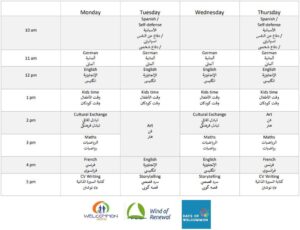 Sadly after the first month the lockdown came and we had to cancel all outside classes. But we figured out a solution and had classes exclusively for the refugees – residents in the hostel, so we could keep up teaching during the lockdown. We designed a new schedule, with new classes to execute during lockdown. Unfortunately our planned classes didn`t match the sleeping schedules of the residents so we had to adapt to that. But little by little we created a kind of normality during the strangest of times.
Sadly after the first month the lockdown came and we had to cancel all outside classes. But we figured out a solution and had classes exclusively for the refugees – residents in the hostel, so we could keep up teaching during the lockdown. We designed a new schedule, with new classes to execute during lockdown. Unfortunately our planned classes didn`t match the sleeping schedules of the residents so we had to adapt to that. But little by little we created a kind of normality during the strangest of times.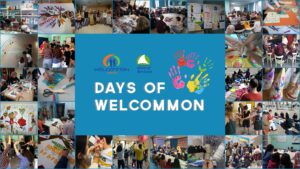 Right from the beginning I loved the concept behind the Welcommon Hostel. That being the unification and combination of sustainable tourism and the accommodation, empowerment and non formal education of refugees. Even though tourism collapsed after Covid, just by the volunteers and refugees living in the same building kept the spark that is the Welcommon Hostel alive.
Right from the beginning I loved the concept behind the Welcommon Hostel. That being the unification and combination of sustainable tourism and the accommodation, empowerment and non formal education of refugees. Even though tourism collapsed after Covid, just by the volunteers and refugees living in the same building kept the spark that is the Welcommon Hostel alive.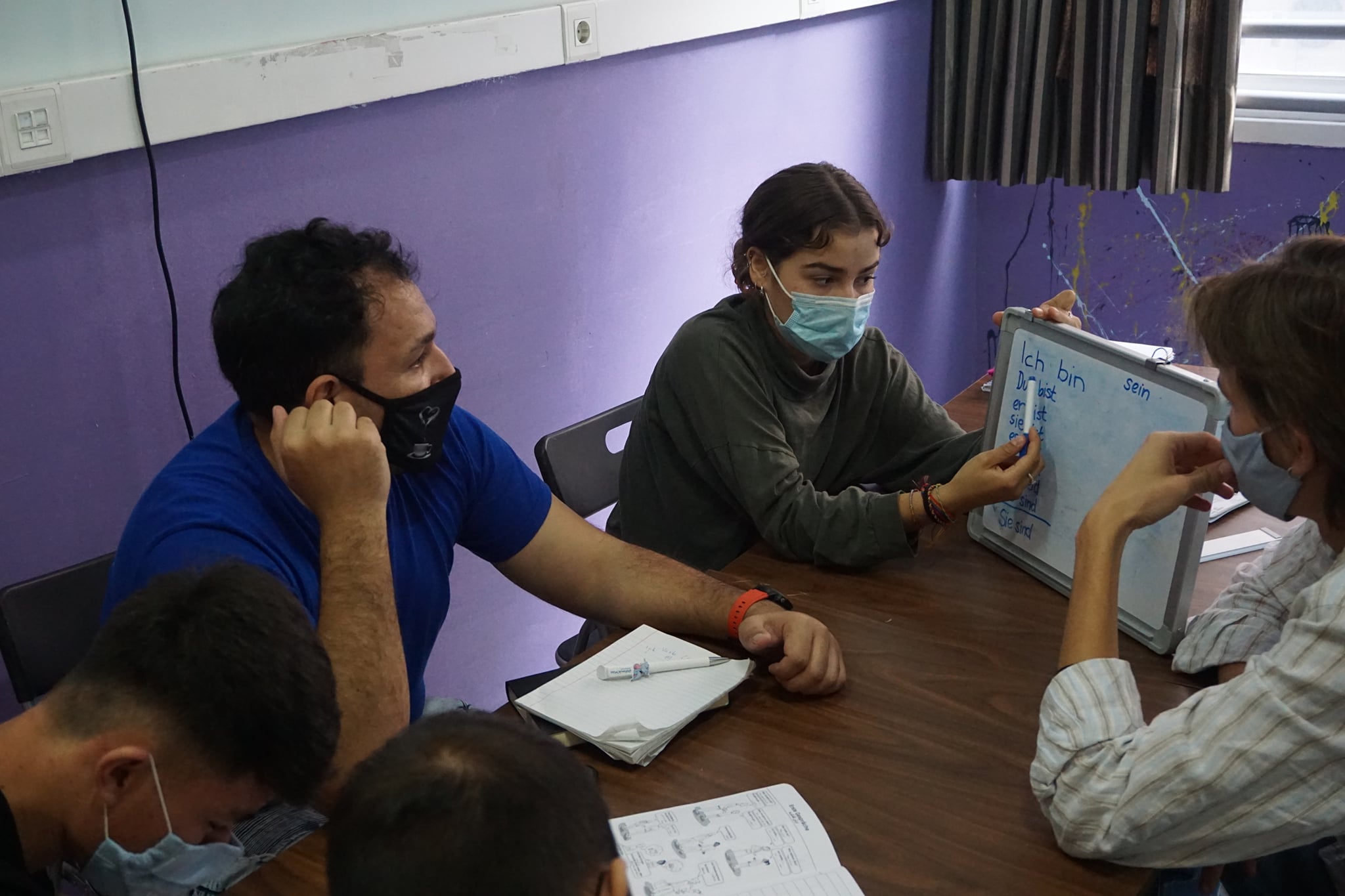
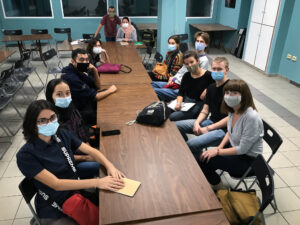 When I first arrived I knew no one and didn’t really know what to do when I entered the classroom and tried to educate my students on the german language. Luckily there were my co-volunteers and the staff of Anemos Ananeosis / Wind of Renewal, who soon turned into friends, that helped me get through this adapting period with useful tips and advice on how to be at ease and still be a good teacher.
When I first arrived I knew no one and didn’t really know what to do when I entered the classroom and tried to educate my students on the german language. Luckily there were my co-volunteers and the staff of Anemos Ananeosis / Wind of Renewal, who soon turned into friends, that helped me get through this adapting period with useful tips and advice on how to be at ease and still be a good teacher.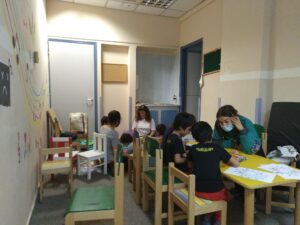 What I liked most about my time in the Welcommon Hostel as a ESC participant, was the teaching and the exchange with the students and really connecting with my co-workers and making a lot of friends in the process. Our students were so
What I liked most about my time in the Welcommon Hostel as a ESC participant, was the teaching and the exchange with the students and really connecting with my co-workers and making a lot of friends in the process. Our students were so 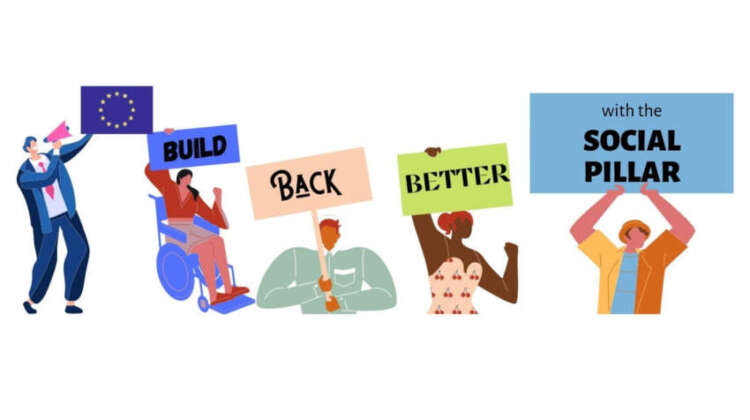

Recent Comments